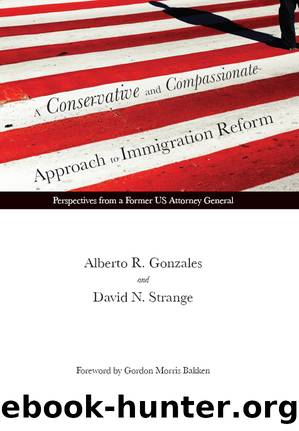A Conservative and Compassionate Approach to Immigration Reform: Perspectives From a Former US Attorney General by Alberto R. Gonzales & David N. Strange

Author:Alberto R. Gonzales & David N. Strange [Gonzales, Alberto R. & Strange, David N.]
Language: eng
Format: epub
ISBN: 9780896728974
Google: mHZVAQAACAAJ
Goodreads: 21944456
Publisher: Texas Tech University Press
Published: 2014-01-15T07:40:57+00:00
Chapter Ten
Dealing with the Children of Unauthorized Immigrants beyond High School
Introduction
The reasons that immigrants come to America are as varied as their countries of origin. Many immigrants bring with them strong work ethics, skills, hope, and often, their children. Many children enter on temporary visas that expire or with their parents without inspection. Regardless of how they enter, these undocumented children have no control over their original and resulting immigrant status in this countryâand more importantly they are often powerless as to their own futures.1 These children are the focus of this chapter.
The Dilemma
There are an estimated eleven million undocumented immigrants present in the United States2 and an estimated one million undocumented minors.3 These children are faced with a dilemma: primed to thrive after receiving a Kâ12 education,4 they are stopped short of fulfilling their potential. Undocumented students are ineligible to work, to serve in the military, or to qualify for in-state college tuition in most states.5 There are an estimated sixty-five thousand undocumented students graduating from American high schools every year who find themselves in difficult situations because of their unlawful status.6 We do not believe that young children should be burdened by the sins of their parents. Sound immigration reform should seriously consider a comprehensive solution that would allow these children to achieve lawful status, providing them with an opportunity to achieve their goals of becoming productive members of American society.
Deferred Action for Childhood Arrivals (DACA)
On June 15, 2012, President Barack Obama signed an executive order providing âdeferred actionâ to many immigrants brought to the United States as children who meet certain specific requirements.7 Specifically, individuals are eligible for deferred action if they:
Came to the United States before their 16th birthday;
Were under age 31 and had no valid immigration status on June 15, 2012;
Have continuously resided in the United States between June 15, 2007, and the present;
Are currently in school, graduated from high school, obtained a GED, or were honorably discharged from the Armed Forces;
Have not been convicted of a felony, a âsignificantâ misdemeanor, or three or more other misdemeanors, and do not otherwise pose a threat to national security or public safety.8
Download
This site does not store any files on its server. We only index and link to content provided by other sites. Please contact the content providers to delete copyright contents if any and email us, we'll remove relevant links or contents immediately.
| Antitrust | Civil Law |
| Emigration & Immigration | Federal Jurisdiction |
| Housing & Urban Development | Indigenous Peoples |
| Land Use | Public |
| Public Contract | Public Utilities |
| Urban, State & Local Government |
Machine Learning at Scale with H2O by Gregory Keys | David Whiting(4284)
Killers of the Flower Moon by David Grann(4029)
Oathbringer (The Stormlight Archive, Book 3) by Brandon Sanderson(3117)
Will by Will Smith(2894)
Once Upon a Broken Heart by Stephanie Garber(2827)
Guns, Germs and Steel by Diamond Jared(2353)
It Starts With Us (It Ends with Us #2) by Colleen Hoover(2320)
Borders by unknow(2300)
Friends, Lovers, and the Big Terrible Thing by Matthew Perry(2209)
The Room Where It Happened by John Bolton;(2143)
The Color of Law by Richard Rothstein(1915)
The Strength In Our Scars by Bianca Sparacino(1833)
HBR's 10 Must Reads 2022 by Harvard Business Review(1830)
A Short History of War by Jeremy Black(1829)
A Game of Thrones (The Illustrated Edition) by George R. R. Martin(1701)
Water Rights and the Environment in the United States by John Burch(1673)
515945210 by Unknown(1659)
Examples & Explanations: Administrative Law by William F. Funk & Richard H. Seamon(1631)
That Every Man Be Armed by Stephen P. Halbrook(1575)
